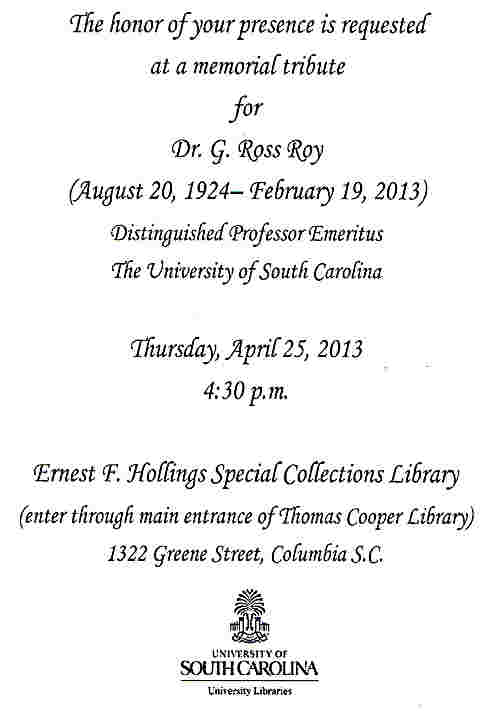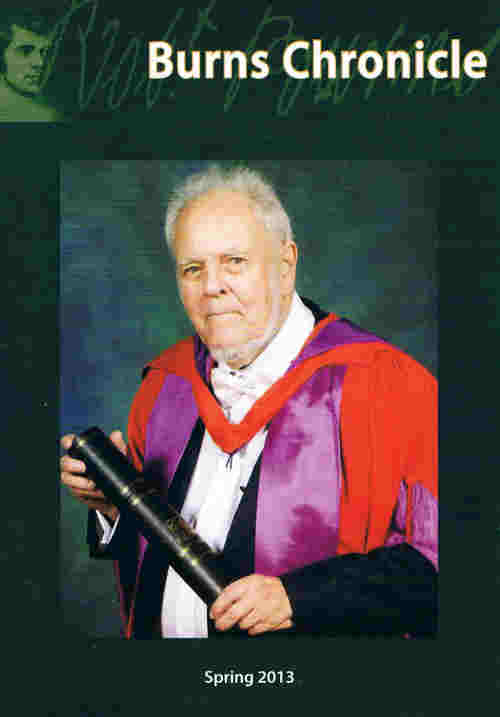|
Edited
by Frank R. Shaw, FSA Scot, Dawsonville, GA, USA
Email:
jurascot@earthlink.net

Susan and I made our way to
Columbia, South Carolina on Thursday, April 25, 2013 to attend the memorial
service for G. Ross Roy, a dear friend, fellow Burnsian and member of our
family. Over the past few months we had realized this day was coming but had
hoped against hope it would happen much farther down the road. He passed
away during the early morning hours of February 19th. Ross fought a good
fight, knowing there were other tasks he wanted to complete. While that was
not to be, it is clear that many excellent works regarding Robert Burns and
Scottish literature had been accomplished by him. Not only did we drive to
Columbia with heavy hearts, but we went knowing so much had been
accomplished by one who had blessed our lives by knowing him.
We were not the only travelers journeying from the Atlanta area to celebrate
Ross’s life. Several members of the Burns Club of Atlanta, President David
Grant, Vice-President Woody Woodward, and Past Presidents Tom Todd, Jim
Montgomery and Jim Powell, also attended to pay tribute to this greatly
respected honorary member of our club. And, flying in from Scotland, was the
Past President of the Robert Burns World Federation and current editor of
the Burns Chronicle, Bill Dawson.
The memorial tribute was held in the prestigious Ernest F. Hollings Special
Collections Library, a place dear to Ross’s heart. I share below a few
thoughts and quotes I jotted down that afternoon.
Those in attendance were welcomed by Dean of Libraries, Thomas McNally. Ross
was well known for his ties of outstanding color, so those in the audience
chuckled when Dean McNally mentioned he had considered wearing a bright tie
to commemorate Ross. I think we were all relieved he decided against doing
so since Ross was the only one could carry off such color. Tom had also been
given a bit of advice by Ross’s sweet wife Lucie who told him to “talk about
Ross and keep it short”. Soft laughter filled the room as Tom did as he was
told!
Elizabeth Suddeth, Director of Rare Books, spoke on “Dr. Roy’s Legacy”. She
spent twelve years working with Dr. Roy, and she spoke about the marvelous
rare book collection he had built over the years as well as the many
original manuscripts collected by him. It is interesting that Ross did not
limit his collecting to Robert Burns alone. Elizabeth told the amazing story
of the gifts of book collections and original manuscripts Ross and Lucie had
bestowed to the university. She also mentioned another of his other gifts to
the university, his collection of John Burroughs.
Patrick Scott then spoke on “Remembering Dr. Ross Roy”. Truer words were
never spoken when, at the beginning of his remarks, Patrick said, “He is
supposed to be here”. Echoing Patrick, I remember telling Susan on our drive
to Columbia that “Ross was always there for us when we needed him”. Dr.
Scott spoke of Dr. Roy’s Jacobite ancestors, his first Burns’ publication in
1962, and the quest for the many chapbooks he was always on the prowl for.
Patrick mentioned that Ross and Lucie’s Studies in Scottish Literature was
created in 1963 and was still priced today at the same $16 per version. It
was delightful to learn that half of the SSL volumes are now online and that
during the first six months there have been 50,000 full texts downloaded.
Patrick concluded his tribute to Ross by saying, “His is a life to honor…”
A “Tribute from Scotland” was to have been delivered by retired Professor
Kenneth Simpson, but unfortunately he was unable to be present and his paper
was read by Bill Dawson. These statements from Ken’s remarks touched us all:
“Ross was the most genial of men…He became my mentor…and despite weakening
health, there was no denying his resolve.” Dr. Simpson was more than just a
good friend of Ross and Lucie’s but has often been referred to as their
“Scottish son”. Ken and Ross worked closely together for many years on
projects, most notably on the Studies in Scottish Literature series.
Thorne Compton, long time friend and former student of Ross’s, spoke on
“Learning to Profess”. He held up to the audience an 1808 copy of The Gentle
Shepherd which Ross had given him decades ago. Ross had impressed on
Professor Compton that “we are professors, so we must profess” and to
“profess what you believe”. He recalled the confines Ross felt were being
put on academics by “small people, sitting in small rooms, talking about
small things”.
Jean Ray Williams, a local Columbia area singer, sang two songs, one after
Patrick Scott spoke and the other after Bill Dawson read Ken’s paper. They
were “Flow Gently, Sweet Afton” and “Will Ye No Come Back Again”, the former
by Robert Burns and the latter by Lady Nairne, Carolina Oliphant. Both were
beautifully sung a cappella.
Dean McNally presented closing remarks by asking Lucie to the podium for
presentation of a gift the library had bought in memory of Ross. It was a
framed copy of “Flow Gently, Sweet Afton” and was one of three copies in
Burns’s own hands. This magnanimous gift is described below in an email from
Patrick Scott when I asked for more detail on the gift:
The new acquisition in memory of Ross was an autograph manuscript of Burns's
song "Flow Gently, Sweet Afton”. Burns wrote the song in 1789, providing new
words for an existing tune, and it was first published in Part 4 of James
Johnson's Scots Musical Museum in 1792. This manuscript, one of only three
known for the song in Burns's own hand, has the title "Afton Braes”. The
manuscript, though recorded in the major manuscript reference work, was not
known to James Kinsley when he edited his standard 3-volume Burns edition,
and it has not previously been available to Burns scholars. A number of
potential buyers were interested in the manuscript, but the library was
specially pleased to be able to get this manuscript because the University
of South Carolina's alma mater, "Hail Carolina" by a professor born in
Afton, Virginia, uses the tune that became the best-known setting of Burns's
words. A full description will be published in the next volume of Studies in
Scottish Literature later this year.
To end the memorial, Cameron Kloot played a Bagpipe Lament as the crowd
dispersed for a lovely reception and to share our thoughts and stories
together about our friend Ross.
(FRS: 4.30.13)

Professor Roy holding his honorary doctorate
from Glasgow University
|

